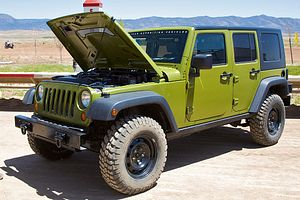On Thursday, the U.S. Embassy in Tajikistan announced Washington’s latest security move in the region. According to a statement from the embassy, the U.S. was donating “$12 million dollars’ worth of U.S. equipment to Tajikistan’s Border Guard Agency.” The donation consisted of two primary components: Tajikistan would be receiving some $9 million dollars’ worth of communication equipment, including radios and software, and $3 million dollars’ worth of Jeep Wranglers.
The donation was funded through CENTCOM’s Counter-Narcotics Program, allowing Tajikistan’s Border Guard Agency “to identify, confiscate, and prevent narcotics crossing Tajikistan’s borders.” As the release continued, U.S. Amb. Elisabeth Millard “noted that the communications equipment and vehicle delivery demonstrates U.S. commitment to the government of Tajikistan to eradicate illegal drug trade.” All told, with the moves, CENTCOM’s total provisions for enhancing Tajikistan’s counter-narcotic efforts now total over $151 million over the past decade, following on the heels of last year’s offer of dozens of pieces of equipment to Tajikistan’s riot police.
While the move fits a pattern of increasingly securitized relations between Washington and Dushanbe, the timing of the donation will likely stir fresh rounds of complaint. Not only has Tajikistan ossified into single-party rule over the past year, but, in just the past week, one of the leading – and oldest – members of the opposition Islamic Renaissance Party of Tajikistan, Qurbon Mannonov, died while still in prison. And as Reporters Without Borders related, the health of imprisoned journalist Khikmatullo Sayfullozoda is “deteriorating dangerously.” All the while, the country’s prosecutor-general has said that Tajikistan jailed some 170 people for “complicity” in a purported coup attempt last year.
Washington’s security moves in Central Asia are, especially recently, rarely tied to improvements on any domestic rights improvements. The latest announcement out of Tajikistan merely confirms this trend — regardless of how well a new fleet of Jeep Wranglers may be able to track drug-runners along Tajikistan’s border.

































